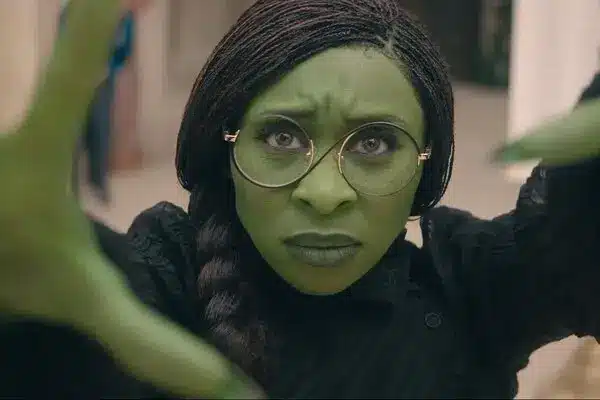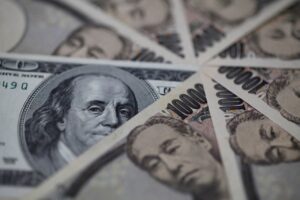
In the land of Oz, everything seems clear: witches are either good or wicked, emerald cities sparkle with promise, and the Wizard always knows best. But from the moment Elphaba steps onstage — green-skinned, sharp-tongued, and instantly othered — “Wicked” starts asking a deeply Jewish question: What happens when the world decides you’re the villain before you even open your mouth?
Adapted from Gregory Maguire’s 1995 novel and now reimagined on screen, “Wicked” is more than a prequel to “The Wizard of Oz.” It’s a story about power and propaganda, about who gets to write history, and who gets scapegoated when society needs someone to blame. Beneath the flying monkeys and glittering gowns lie themes that will feel strikingly familiar to Jewish audiences: being marked as different, learning to live with that difference, and choosing moral responsibility even when it makes you unpopular — or unsafe.
From Elphaba’s status as an outcast to the Wizard’s use of fear to unite the masses, “Wicked” echoes core Jewish narratives about exile, persecution, resistance, and the eternal struggle to “do the right thing” in a world that rewards uniformity. Look closely, and Oz begins to resemble something more uncomfortable than a fantasy kingdom: It starts to look like every place Jews have ever had to decide whether to blend in or be branded as wicked.
Before “Wicked: For Good,” the second installment of the film, premieres in theaters on November 21, let’s unpack what makes the story of “Wicked” so resonant with Jewish audiences.
Telling a story about fascism
American singer and actress Idina Menzel of “Wicked” performs on stage during the “58th Annual Tony Awards” at Radio City Music Hall on June 6, 2004 in New York City. (Photo by Frank Micelotta/Getty Images)
“Wicked” takes place in the fictional world of Oz in part to explore the idea of “evil” removed from real-world conflicts, a way to examine how fascism, propaganda, and oppression take root without pointing to any single contemporary society. That distance was deliberate on Maguire’s part: he has said that his earliest impulse was to write a historical fiction novel about Hitler, but pivoted to Oz as a parable-rich setting where he could probe how societies manufacture villains and justify cruelty.
The stage musical then filters that story through a particular cultural lens. Its creators, several of whom are Jewish, adapted Maguire’s novel into a show that echoes Jewish historical experience: the dynamics of othering, scapegoating, and state-sponsored fear. In that sense, “Wicked” becomes not just a tale about misunderstood witches, but a broader commentary on antisemitism and the way societies manufacture enemies to justify their power.
Cynthia Erivo and Ariana Grande in “Wicked For Good” (Giles Keyte/Universal Pictures)
Scapegoating and the Jewish metaphor
The central conflict of “Wicked” is built around scapegoating — and that idea is literally Jewish in origin. The term “scapegoat” comes from the Yom Kippur ritual in Leviticus, where a goat symbolically carries the community’s sins into the wilderness.
Against that backdrop, it’s hard not to notice that Dr. Dillamond — the marginalized professor whose voice is stripped away as Oz turns authoritarian — is a goat.
Onstage, Dillamond’s removal and the Animals’ persecution unfold with chilling familiarity. In songs like “Something Bad,” he senses the shift early: a regime consolidates power by deciding certain bodies are “unnatural” and certain voices are dangerous. The Animals, once woven into public life, are gradually silenced, pushed out of respected positions, and recast as threats to social order. Read through a Jewish lens, their plight mirrors the dehumanization of Jews during the rise of Nazi Germany in the 1930s: a process carried out not only through violence, but through propaganda, policy, and the slow normalization of exclusion.
Dr. Dillamond in “Wicked” (Universal Pictures)
As Dr. Dillamond is dehumanized by the government of Oz, he is met with silence and indifference from his students. “Once they take your voice away, they can do anything to you,” he warns — a line that lands like historical memory.
That same mechanism shapes Elphaba’s arc. She isn’t hunted for what she’s done, but for what she is, and for the stories the state projects onto her. In Oz, Elphaba and the Animals become convenient scapegoats for the Wizard’s rule — a shared enemy to rally the so-called “good” majority. As the Wizard puts it, “The best way to bring folks together is to give them a real good enemy.”
That quote is the show’s thesis on how hatred spreads. “Wicked” doesn’t just map oppression; it shows the machinery: invent a threat, repeat it until it feels like common sense, and use that fear to tighten control. It’s a playbook Jews recognize across centuries of antisemitism — dehumanize, distort, repeat.
The lie that Elphaba is “unclean,” dangerous by nature, and can be destroyed by something as “pure” as water sharpens that point further. The accusation that Jews are dirty, contaminating, or spiritually impure has been a core antisemitic trope since medieval Europe and was weaponized at its most extreme in Nazi ideology. “Wicked” dramatizes how that kind of myth metastasizes: difference becomes “proof” of danger once a regime decides it needs an enemy.
Cynthia Erivo as Elphaba and Ariana Grande as Glinda in “Wicked” (Universal Pictures)
Glinda’s role makes the whole system even more painful. She isn’t cruel the way Madame Morrible and the Wizard are cruel; she’s complicit. Glinda knows Elphaba’s heart and sees the erasure of the Animals, yet chooses safety, applause, and belonging over solidarity. Her sacrifice of Elphaba to preserve her place among the “good” underscores how easily goodness becomes a costume when conscience comes with a social cost. For many Jewish viewers, that betrayal echoes familiar historical wounds: moments when supposed allies stayed silent or demanded Jews make themselves smaller to remain acceptable, an ache that has felt newly raw in recent years.
And still, the show offers a counter-ethic. Elphaba’s insistence that “some of us are just different” is not a plea for pity, but a demand for dignity. “Wicked” suggests that scapegoating rarely targets only one group, and that liberation depends on refusing to be divided. Hate thrives by isolating communities; it weakens when those communities recognize shared vulnerability and choose alliance over acceptance.
“There’s a line in the show that says, ‘The people just need a really good enemy. They need a scapegoat.’ Throughout history, Jews have been designated as that scapegoat. If there’s an issue, the Jews did it. This happens time and time again — the Inquisition, the Crusades, the Holocaust — and that’s exactly what is happening here on the show. It’s happened to other minority groups, but as a Jewish woman, I can only bring my experience, and it hits really hard. The weight of it is not lost on me, and I consider it my duty to tell the story with my own personal thoughts and experiences intertwined with it,” Jewish actress Talia Suskauer said of playing Elphaba on Broadway.
Witches and antisemitism
The “wicked witch of the West” archetype doesn’t come out of nowhere — it borrows heavily from antisemitic and other dehumanizing stereotypes. Think about the classic witch image: hooked nose, exaggerated features, sinister otherness. That visual language overlaps a lot with the way Jews have been caricatured for centuries.
Jeff Goldblum as the Wizard and Cynthia Erivo as Elphaba (Giles Keyte/Universal Pictures)
“Wicked” leans into and subverts that imagery. Elphaba is marked as “other,” blamed for society’s problems, and turned into a symbol of evil by those in power. The themes are broad enough that many people can see their own experiences in her story, and that’s part of the show’s power. But the narrative is also grounded in something specific: a long history of Jewish difference being depicted as threatening, corrupting, or inhuman.
Before “witches” became Europe’s default targets for calamity, Jews were often cast in that role — portrayed as evil, demonic outsiders blamed for poisoning wells, spreading plagues, and even killing or eating children. Many of the myths later attached to witches were first used to demonize Jews.
Even the familiar pointy witch hat is often linked by historians to the Judenhut — a cone-shaped cap associated with Jews in medieval Europe. At first, Jews wore versions of this hat voluntarily in some places, but after the Fourth Lateran Council in 1215, many Christian authorities began requiring Jews to wear distinctive headgear to mark them out in public. By the 1200s and 1300s, the pointed silhouette became a standard cue for “Jewishness” in European art, and over time it drifted into broader imagery for outsiders and supposed sorcerers, helping shape the later stereotype of the witch.
The Jewish DNA of “Wicked”
None of this means the show can’t be universal. It obviously is. But it is also deeply legible through a Jewish lens, in part because of who shaped it. Composer Stephen Schwartz and book-writer Winnie Holzman are Jewish, and producer Marc Platt has described “Wicked” as a story rooted in Jewish values — a parable about otherness, tolerance, and moral courage under authoritarianism.
Ariana Grande, Jonathan Bailey, and Ethan Slater in “Wicked” (Universal Pictures).
Jewish performers have long carried that resonance forward, from Idina Menzel’s original Elphaba to later Broadway powerhouses like Shoshana Bean, Caissie Levy, and Suskauer. The film continues that lineage with Jewish actors in major roles, including Jeff Goldblum as the Wizard and Ethan Slater as Boq.
Related post: Is ‘Wicked’ star Ethan Slater Jewish? Unpacking everything we know about his background
“I think a lot of musical theater themes speak to Jewish audiences because, in many instances, musicals are about outsiders, striving to discover how they might fit in. That’s the story of ‘Hamilton,’ ‘Billy Elliott’ — none of them so-called Jewish musicals. ‘Wicked’ is not overtly Jewish-themed, but it certainly resonates with many Jewish people’s experience,” Schwartz said.
Even though the musical isn’t explicitly Jewish, it still feels Jewish in its bones. Platt takes the thought one step further, arguing that for him, this particular story wasn’t just resonant, but deeply personal, almost an extension of identity itself.
“[Wicked] was early in my producing career, and I always felt very strongly that it was an extension of my Jewishness, that story. It’s about tolerance. It’s about being another. Its metaphor is about a leader coming in and blaming the underrepresented for the ills of society,” Platt said of producing the Broadway and film adaptations, adding that he and the writers had spoken a lot about the Holocaust and fascism in Germany throughout the production stages.
In other words, “Wicked” isn’t a story that becomes Jewish only when you squint. It’s Jewish in the way it understands power, fear, and the cost of being marked as different. Oz is fantasy, but the logic of Oz is real. And by making us watch a society decide who is “wicked” — and why — “Wicked” asks Jewish audiences to recognize an old story in new paint, and to remember what it takes to defy it.





